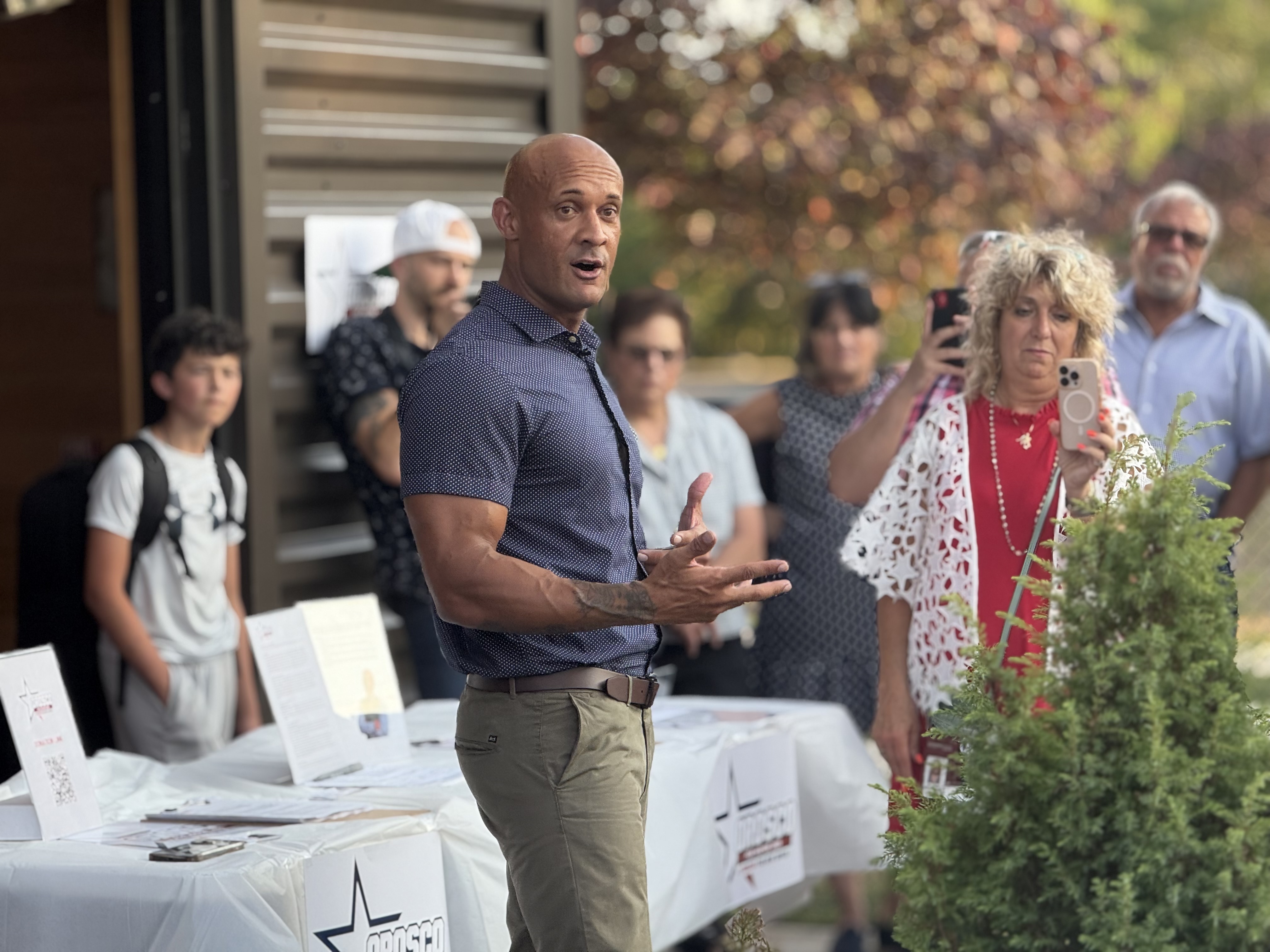
Adam Walker Photo
Orosco: “Mayor Elicker doesn’t represent the city of New Haven."
With BBQ smoke in the air, Smash HQ mixed-martial arts gym owner Steve Orosco officially launched his Republican run for mayor — with a campaign kickoff focused on unseating three-term incumbent Democrat Mayor Justin Elicker.
Now that Orosco has raised just over $5,000 for his challenge campaign, meanwhile, he has triggered the “contested election” clause of New Haven’s clean-elections public financing program — thereby allowing Elicker to apply for a city-funded $25,000 grant, which the mayor said he plans to do.
Orosco, a 44-year-old Morris Cove resident and supporter of President Donald Trump, hosted a campaign launch party from 6 to 8 p.m. at Bear’s Smokehouse BBQ at 470 James St.
Roughly 40 people attended, including Orosco’s wife Jeannine and son Jaxson, Republican Town Committee Chair John Carlson, Orosco campaign strategist Jason Bartlett, and several Republicans running for various alder seats, including Morris Cove’s Anthony Acri.
Orosco is looking to become the first Republican since 1953 to be elected mayor. Every contested local elected office in New Haven is currently held by a Democrat. Registered Democrats outnumber registered Republicans in the city by roughly a 10-to‑1 margin.
Orosco first filed his candidacy at the City Clerk’s office in March to appear on the Nov. 4 general election ballot. On July 10, he reported raising around $6,500 over the past three months — including $1,000 apiece from four different donors. Elicker, by contrast, raised just over $30,000 last quarter, and has raised a total of $139,000 so far this campaign season.
The Republican challenger’s campaign fundraising nevertheless has crossed a key $5,000 threshold for the city’s Democracy Fund — a municipal public financing program for mayoral candidates that Orosco is not participating in, but Elicker is. Orosco clearing $5,000 means that Elicker can now apply for a $25,000 grant as well as for matching funds for donations worth up to $35 apiece that are made by New Haven residents.
In a Friday interview, Elicker said he plans on applying for both the grant and the matching funds — a move that Orosco criticized as an undue burden on taxpayer money. Elicker defended the decision as supporting a clean-elections program that helps reduce the influence of private money on local politics. (See more on that below.)
Orosco: This Is Not About "Republican Vs. Democrat"
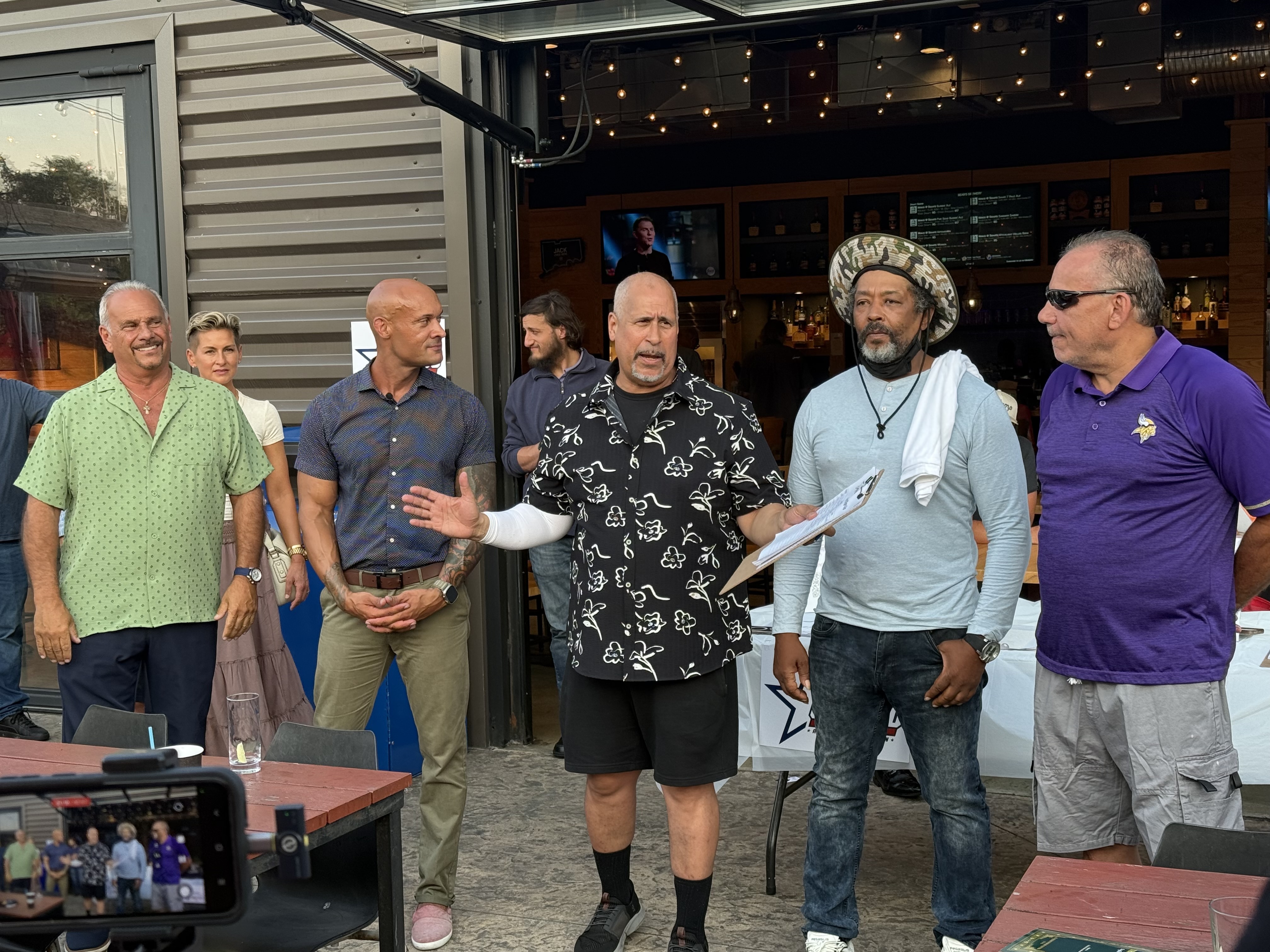
Anthony Acri, Steve Orosco, Jason Bartlett, Perry Flowers, and Robert Vitello.
In an interview with the Independent Thursday at his campaign kickoff event, Orosco accused Elicker of being disconnected from the city’s realities and overly aligned with Yale.
“Mayor Elicker doesn’t represent the city of New Haven,” he said. “Mayor Elicker represents Yale. He went to Yale. He knows nothing about these streets.” Elicker earned dual master’s degrees in 2010 from the Yale School of Forestry & Environmental Studies (now the School of the Environment) and the Yale School of Management.
In a Friday morning interview, Elicker pushed back on those claims, calling the attack “silly” and pointing to his administration’s role in boosting Yale’s voluntary payment to the city from $13 million to $24 million annually as part of a six-year deal approved by the alders in April 2022.
Raised in Newport, Rhode Island, Orosco comes from a multicultural family with Trinidadian and Scottish-Canadian roots. He often cites this background as emblematic of the American Dream and central to his commitment to representing New Haven’s full diversity.
He told the Independent he views himself as a political outsider focused on building a broad, cross-partisan coalition. “This is not a Republican versus Democrat [race],” he said. “It’s literally, you got to come together as one unit and go against Yale, the budget, and fight for all the things that people actually care about.”
Orosco highlighted his personal experience as a “fighter” — both in mixed martial arts and in life — as evidence of his ability to connect with residents outside traditional political circles. He said he’s met with city leaders, alders, and union representatives who he claims often shared his concerns privately, but felt restrained by party loyalty.
“If you’re going to tell me you’re not going to vote for me simply because there’s an ‘R’ next to my name, to me, that is just wild,” he said.
Speaking to a crowd of supporters, Orosco described spending the early months of his campaign not on fundraising, but walking neighborhoods, speaking with city staff, deputies, and individuals with criminal records who distrust politicians. He said his reputation as a fighter resonates with residents who feel unheard and unsupported. He also outlined what he views as the city’s core crises: budget mismanagement, failure to prioritize economic development, and Yale’s outsized presence.
He proposed launching a full city audit to assess spending and increase fiscal transparency, which he said is a top concern among residents. He criticized New Haven’s abundance of tax-exempt properties, arguing it hinders economic development. He questioned how “affordable housing” is currently defined and implemented, arguing that it often fails to serve the city’s most vulnerable residents and instead benefits outside interests.
Orosco also criticized the APT Foundation’s planned methadone clinic relocation to Long Wharf, arguing that the area is one of the city’s most valuable undeveloped economic zones and should be leveraged for job creation and growth. Elicker has defended his administration’s pending deal with APT as helping move the organization’s controversial methadone clinic away from Congress Avenue in the Hill and to a to-be-built new building on Sargent Drive that will be designed to facilitate people getting substance use disorder treatment in a responsible way.
Also on Thursday, Orosco pledged to implement a “Made in New Haven” initiative day one in office to boost local hiring through tax incentives and said the Housing Authority must be held accountable to meet training and employment mandates. He stressed the importance of breaking generational poverty and said the city’s redevelopment efforts must benefit low-income residents — not just developers.
In his campaign for a fourth two-year term, Elicker has defended his administration’s record in supporting new affordable housing and a new schools superintendent. In regards to public safety, he’s pointed to his administration’s support for task forces on violent crime and stolen cars, as well as its investments in violence intervention programs, street outreach workers, and improved police technology. He has also traveled the city touting the conversion of oft-vacant publicly owned buildings in city parks into new youth, rec, and senior hubs and community centers.
Several local candidates also turned out Thursday to back Orosco’s bid, including alder hopefuls Robert Vitello (Ward 12), Perry Flowers (Ward 30), and Anthony Acri (Ward 18), who echoed the campaign’s call for system-wide change.
Jason Bartlett, Orosco’s campaign strategist and a registered Democrat, described himself as a “bad Democrat”— someone who no longer blindly supports party nominees and instead prioritizes individual candidates over party loyalty. He said his backing of Orosco reflects a broader shift in his political values toward people-focused leadership and away from what he sees as the failures of New Haven’s dominant one-party system.
“There’s no two-party system in New Haven, and I think that leads to bad decisions,” Bartlett said, adding that the absence of minority ideological voices on the Board of Alders is particularly troubling to him. All 30 current members of the Board of Alders are Democrats.
He said he supports creating more political alternatives and hopes to one day help build a viable third or even fourth party in Connecticut politics.
“I support people. I’m much more of an independent and actually want to utilize my political skills going forward in terms of creating a third party or a third and fourth party,” he said.
Bartlett, who served as campaign manager last year for Nadia Milleron during her unsuccessful independent congressional run in Massachusetts, said he plans to support Democrats, Republicans, and independents this cycle based on their individual merit and platforms. In New Haven, he believes Orosco’s message is the clearest match with his own priorities — particularly on youth engagement and accountability.
“I think Orosco will be a bold and fresh young person who will take a different look at some of our chronic problems,” Bartlett said.
This election is not Orosco’s first political bid in New Haven politics. He previously ran twice for the State Senate seat held by Democrat Martin Looney and also mounted a challenge for the Morris Cove alder seat against Sal DeCola. He lost all those races. He’s also an avid poster of videos on Instagram.
Democracy Fund Debated
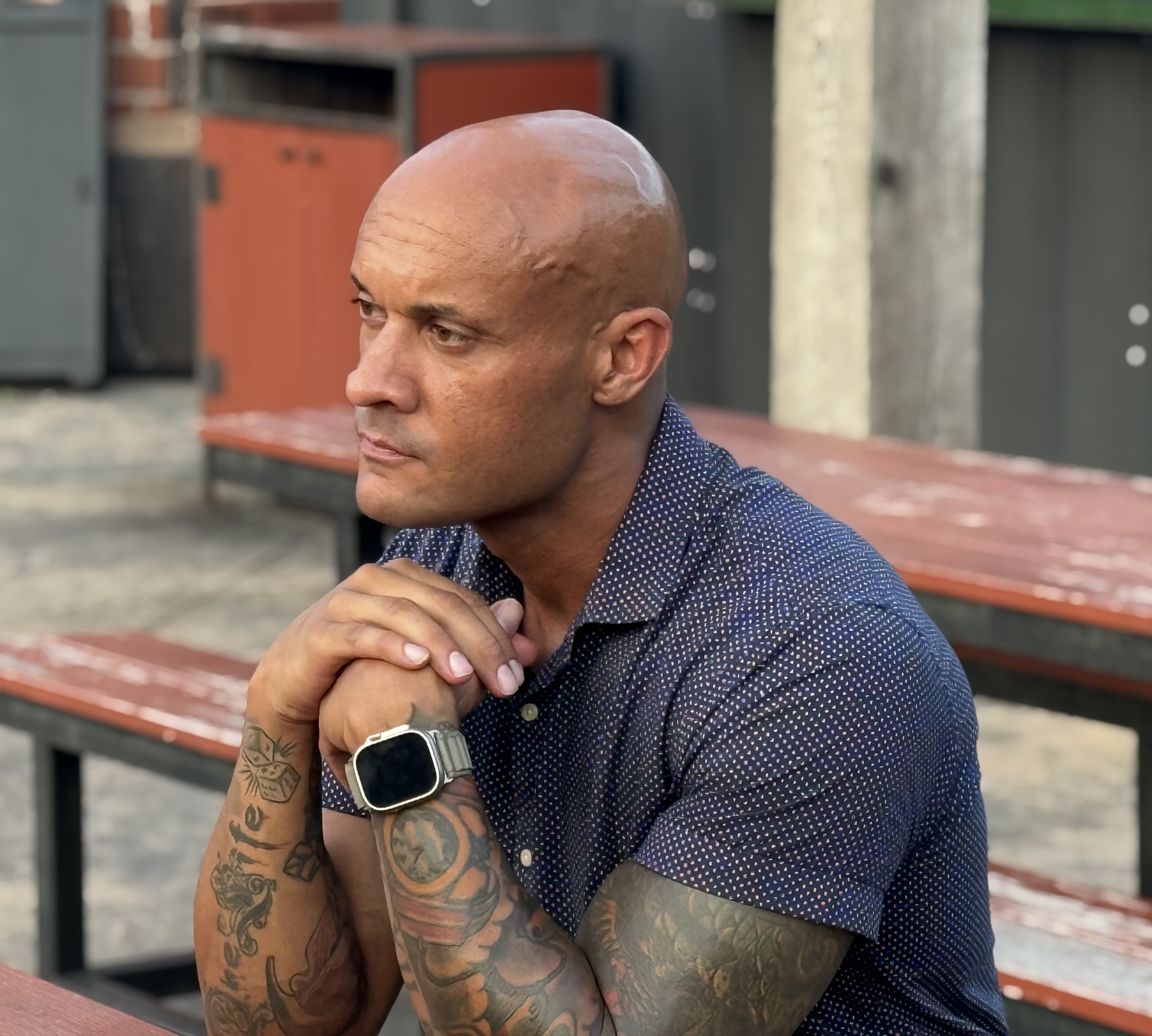
Orosco: “I’m going private because I’m not using taxpayer funds."
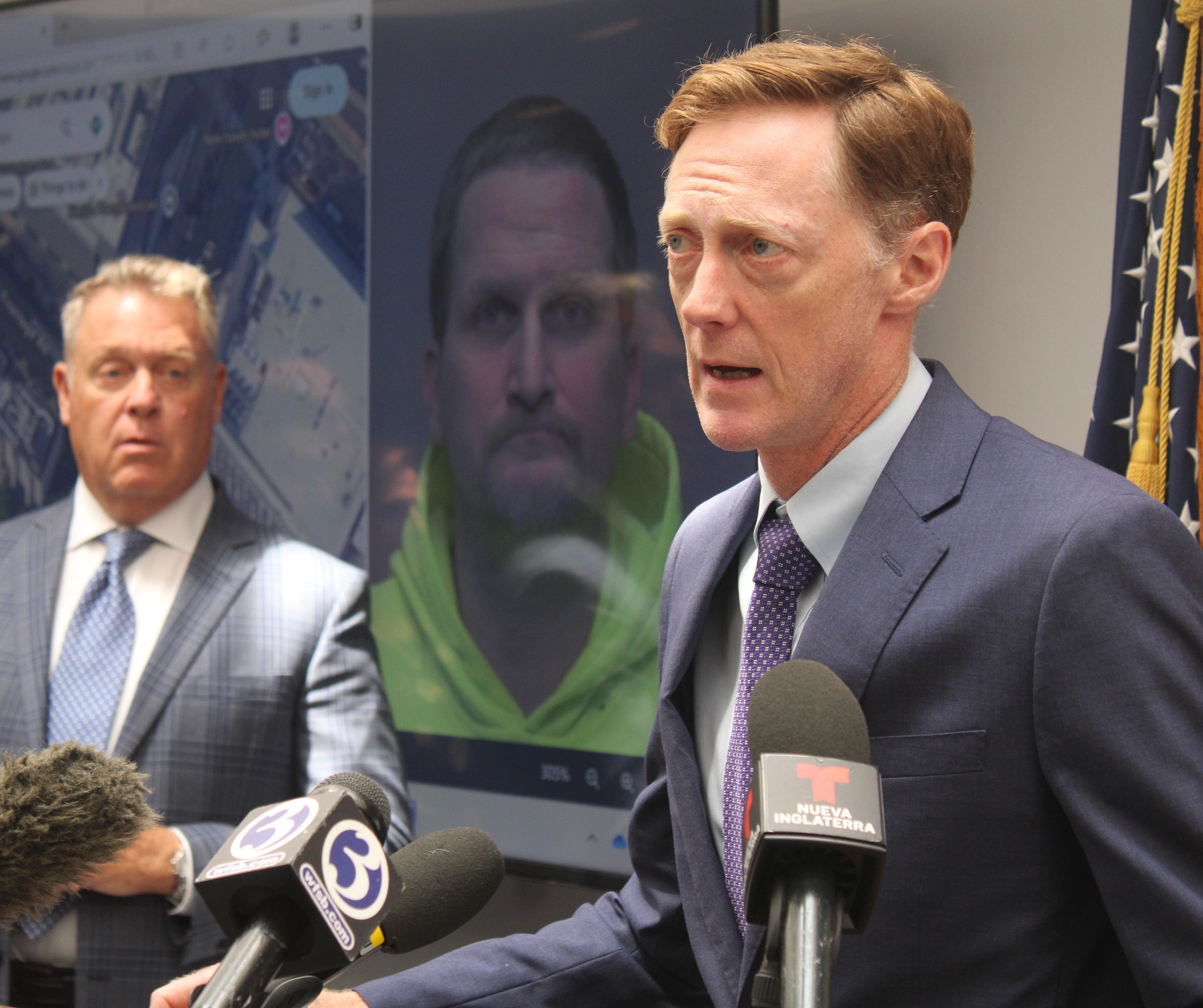
Thomas Breen photo
Elicker (right): "I'm a big believer in the Democracy Fund. I've participated in the Democracy Fund every time I've run for mayor because thousand-dollar donors shouldn't influence elections."
The current mayoral race is now officially considered a “contested election” under the rules of New Haven’s Democracy Fund, a public campaign financing program that offers matching funds and lump-sum grants to mayoral candidates who voluntarily cap individual donations and reject money from special interest groups.
Under the program’s rules, candidates agree to voluntarily limit individual contributions to $400, avoid donations from businesses, unions, or political action committees, and commit to participating in at least one public debate. In exchange, the city offers a 2‑to‑1 match on contributions from registered New Haven voters, up to $35 per donor, as well as a $25,000 grant once candidates secure ballot access. Any unspent funds must be returned, and all expenses are subject to public disclosure and audit.
Orosco is not participating in the Democracy Fund, while Elicker is, just as he’s done every time he’s run for mayor.
Because Orosco has raised over $5,000 — he raised $6,500 last quarter, including from four individual who donated $1,000 apiece — his campaign meets the “contested election” threshold under the Fund’s rules. That allows Elicker, as a participating candidate, to access the additional $25,000 in taxpayer-funded grant money, provided he submits the necessary paperwork and appears on the ballot.
On Thursday, Orosco criticized the use of public campaign funds in a time marked by school closures and potential teacher layoffs, arguing that taxpayer money should go toward essential city services and struggling residents — not political campaigns.
“I’m going private because I’m not using taxpayer funds. We’re [in a] budget deficit, which means you’re gonna take money from the city to pay for your campaign. That’s the craziest thing I’ve ever heard,” he said.
As a non-participating candidate, Orosco is not bound by the Democracy Fund’s restrictions and may raise larger individual contributions — up to $1,000 apiece — and use unlimited personal funds on his campaign.
Republican Town Committee Chair John Carlson, who previously used the Democracy Fund in his own campaign for mayor in 2021, said he would have participated in the Democracy Fund again if he himself were running this year. Carlson predicted that Elicker will ultimately apply for the $25,000 Democracy Fund grant, now that the contested election threshold has been met.
“He’s definitely going to use it,” Carlson told the Independent.
Carlson added that he’s surprised no other Democrat has entered the race to challenge Elicker and that he plans to support Orosco by canvassing, attending events, and amplifying his campaign on social media.
Elicker’s team, meanwhile, confirmed this week that the campaign is now eligible to apply for Democracy Fund matching funds. In a Thursday email, “Team Elicker” announced plans to submit its funding request after the end of the month and shared that over 430 New Haven residents have already contributed to the campaign. The team said it aims to reach 500 donors before submitting the application, noting that each eligible donation is matched 2‑to‑1 under the program.
Mayor Elicker confirmed to the Independent on Friday morning that he will accept the $25,000 public campaign grant.
Responding to criticism from Orosco about using taxpayer money for political campaigns. Elicker defended the public financing program as a way to keep big donors from influencing local politics.
“I’m a big believer in the Democracy Fund,” Elicker said Friday. “I’ve participated in the Democracy Fund every time I’ve run for mayor because thousand-dollar donors shouldn’t influence elections.”
To qualify for funding, Elicker must also participate in at least one public forum. In past cycles, such debates have featured a panel of local journalists and transformed into open forums if only one candidate shows up. According to Aly Heimer, the Democracy Fund’s administrator, as of Thursday evening, Elicker has not yet submitted his official request for the grant.
Orosco is expected to continue campaigning across the city in the coming weeks, with a focus on public safety, education reform, and holding large institutions like Yale financially accountable. He said he welcomes debate, including the possibility of challenging Elicker to appear with him.
“If only Democrats in New Haven used the same energy on their own party that’s failed them as they do against Trump,” Orosco said, “the city would change overnight.”
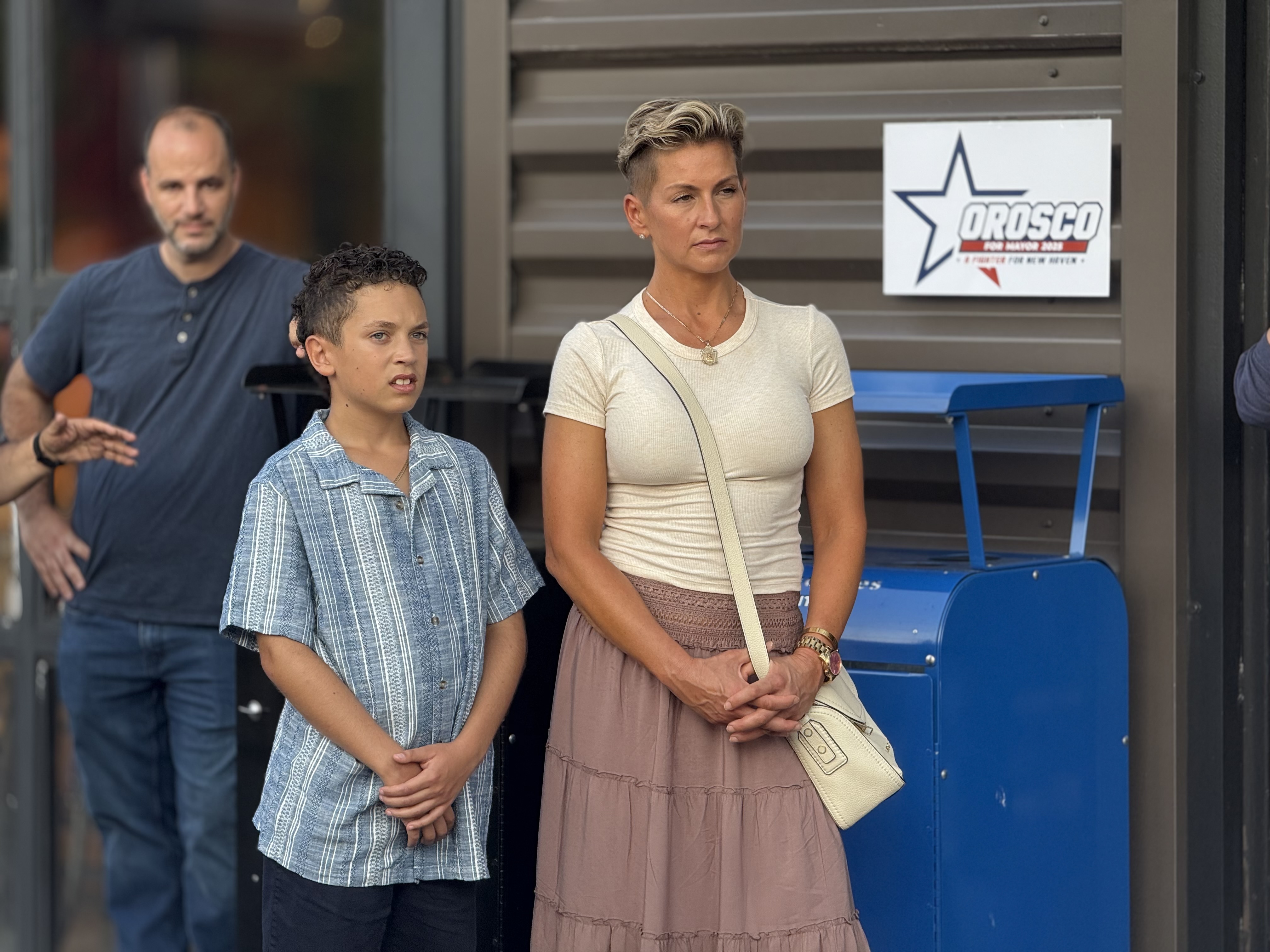
Orosco's wife and son.

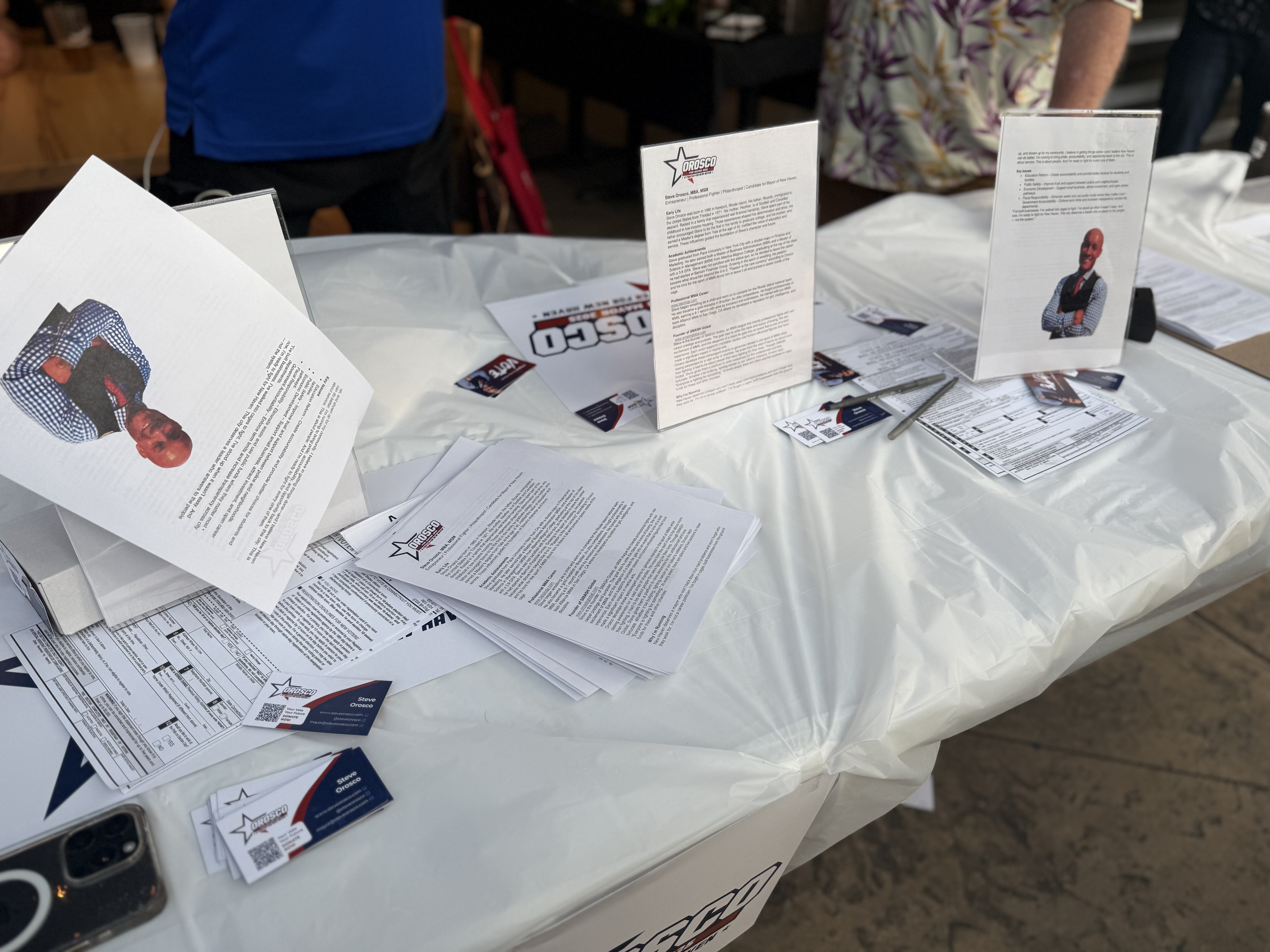
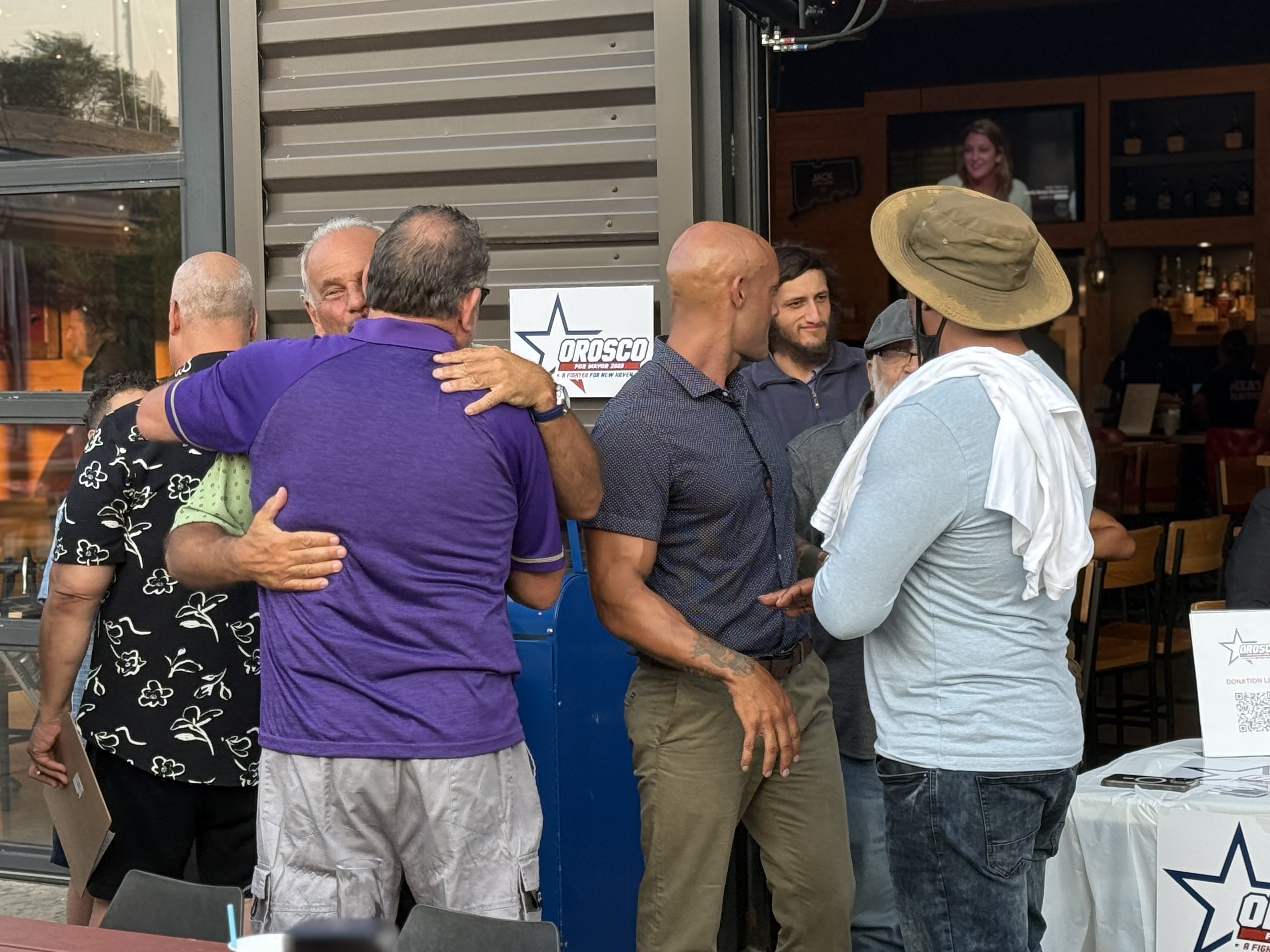
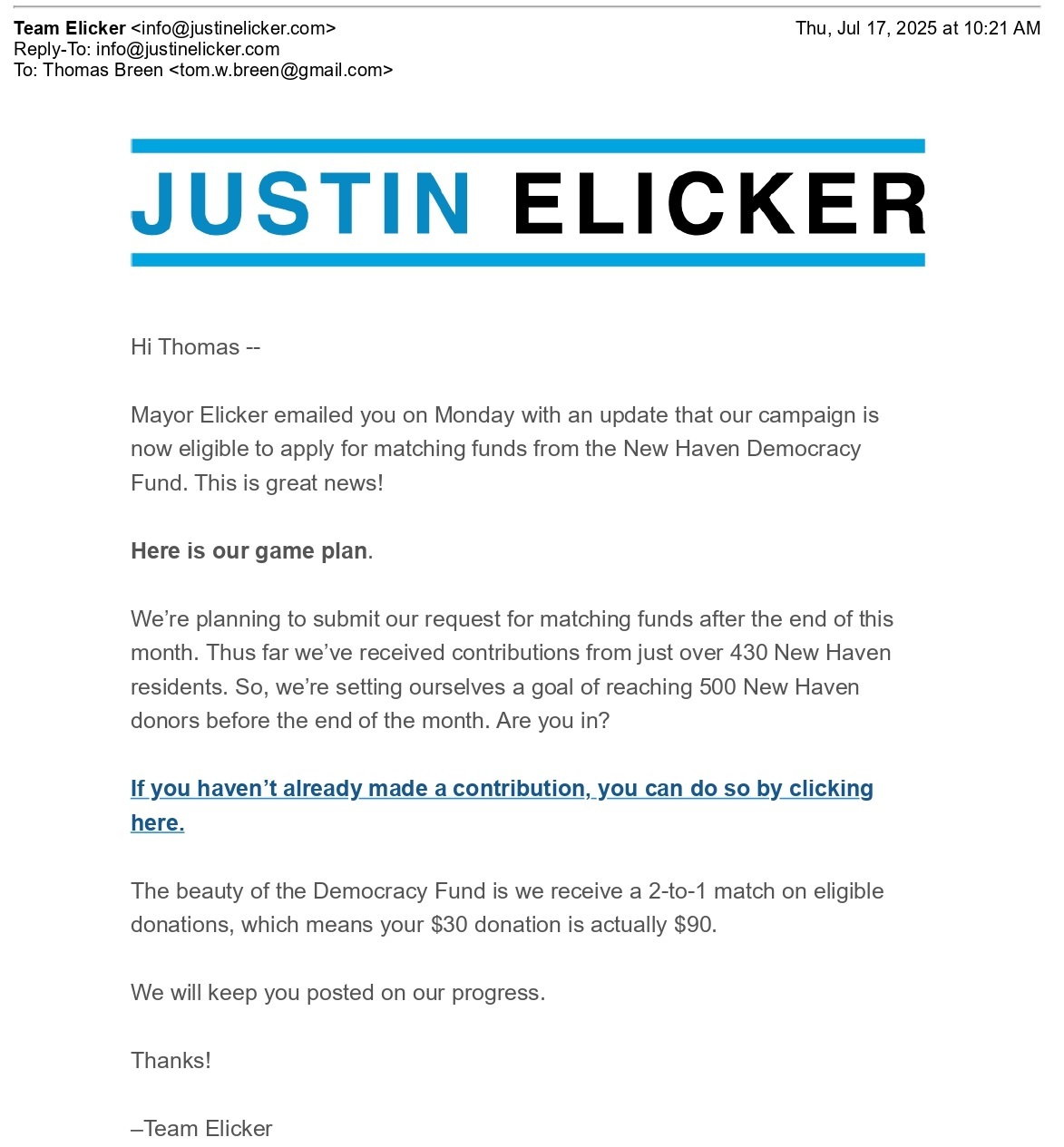
The Elicker campaign's fundraising email on Thursday.